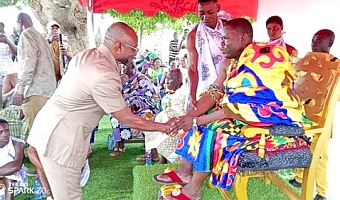Project Targets Rising Sea Levels, Displacement, and Livelihood Protection
A US$3.2 million climate resilience initiative aimed at protecting vulnerable coastal populations in Ghana and Côte d’Ivoire has been launched in Whuti, Anloga District of the Volta Region.
The project, titled Improving Resilience of Coastal Communities in Côte d’Ivoire and Ghana, seeks to safeguard livelihoods, ecosystems, and infrastructure from the growing threat of sea-level rise and flooding.
Funded by the Adaptation Fund and implemented by ActionAid Ghana in partnership with UN-Habitat and Habitat for Humanity International, the initiative will run for 34 months across 11 high-risk communities in the Volta and Greater Accra regions.
Read Also: Gender breakthrough: CID boss joins Interpol Africa Committee as first Ghanaian woman
Climate Threat to Ghana’s Coastline
Ghana is losing an average of two metres of coastline every year, with some hotspots like Fuveme recording losses of up to eight metres annually, according to ActionAid Ghana’s Country Director, John Nkaw.
A recent EPA report shows that 37% of Ghana’s coastline is under severe threat, while NADMO has warned that 1.2 million people risk displacement if sea levels continue to rise.
The Ghana Statistical Service also estimates potential economic losses of US$1.3 billion annually by 2050 from climate-induced flooding and sea-level rise.
Safeguarding Livelihoods and Ecosystems
The project focuses on:
- Early warning systems to improve preparedness.
- Nature-based and engineered solutions for shoreline protection.
- Climate-resilient livelihoods to secure income sources.
- Community-led design and ownership to ensure sustainability.
Regional Minister James Gunu hailed the initiative as timely, noting that it “offers hope and demonstrates the power of collaboration” in addressing the climate crisis.
The Anloga District Chief Executive (DCE), Sandra Seyram Kpedor, added that the project’s emphasis on co-ownership and sustainability was “highly appropriate and transformative.”

























